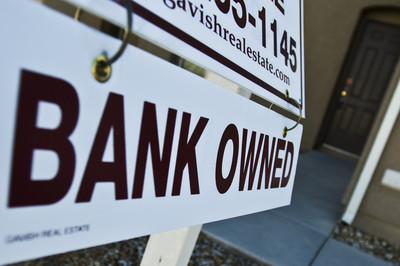Nevada leaders welcome foreclosure crisis aid
Nevada business and political leaders like some aspects of President Barack Obama's $75 billion home loan plan although some question whether the administration is spending enough to help right the housing market.
"Anything that we can do that will stabilize the housing market is a good thing," said William Uffelman, chief executive of the Nevada Bankers Association.
"If it works, at least we can put a floor under the market and see where it can go," Uffelman said.
The question is how much will it cost to stabilize the housing market, he said.
Brock Davis, owner of US Express Mortgage, said the plan could boost consumer confidence and encourage more consumers to buy homes, but he thinks the sum Obama is proposing is too small.
"The reality is it's not even a drop in the bucket," Davis said.
Obama said the plan would help up to 9 million homeowners refinance their homes or avoid foreclosure.
Davis, however, sees political leaders and non-elected government officials moving in opposite directions. While politicians try to increase mortgage lending, regulators are imposing tougher restrictions, Davis said.
Assembly Speaker Barbara Buckley, D-Las Vegas, welcomed the announcement.
"With Nevada leading the nation in home foreclosures, Nevadans need help," she said. "This initiative creates incentives for servicers and lenders to work with borrowers to stem the foreclosure crisis." She said that she is sponsoring a bill that would require lenders to participate in mediation before foreclosing on an owner-occupied home.
Senate Majority Leader Harry Reid, D-Nev., applauded the plan: "This plan will start to rebuild the communities hurt by foreclosures because we all have a stake in curing this epidemic. It will help families with unaffordable monthly payments and those who owe more on their mortgage than their home is worth."
Reid said "record-high foreclosures are the root of the broader economic crisis, (and) we must responsibly commit significant resources to help Americans keep their homes if we are to prevent a bad situation from getting worse."
Tory Mazzola, a spokesman for Sen. John Ensign, R-Nev., was noncommittal. "We'll certainly take a look at it," Mazzola said, noting that Democrats refused to include Ensign's mortgage loan proposal in the stimulus bill.
The plan does not provide much for Nevada homeowners who owe more than 5 percent more on their mortgage than their home is now worth, according to the Mortgage Bankers Association.
"This will limit the plan's success in some of the hardest-hit areas in California, Florida, Nevada and Arizona, as well as some areas on the East Coast," MBA Chief Executive Officer John Courson said in a statement.
Bankruptcy attorneys said that a "cram-down" provision in Obama's plan would help homeowners struggling to pay mortgages but could hurt lenders.
Some years ago, bankruptcy judges used cram-down procedures to enable homeowners to keep their homes by changing the interest rates, the principal amount owed or the term length of the mortgage.
If the law were changed, bankruptcy judges could order a lender to reduce the principal amount owed, potentially helping homeowners who owe more than their homes are now worth.
"You are taking from the lender or whoever owns the loan and giving it to the consumer," bankruptcy attorney Rob Charles said.
Lenders may be more willing to extend the length of time over which the loan is repaid as long as they recover the amount owed and interest, Charles said. Under Obama's proposal, lenders would lower interest rates so a borrower's monthly mortgage payment does not exceed 38 percent of pretax income, and then the Treasury Department will match those reductions dollar-for-dollar to bring payments down to 31 percent of pretax income.
Several bills pending in Congress would allow bankruptcy judges to cram-down the principal owed on mortgages, Uffelman said. He predicted that cram-downs will increase interest expenses on mortgage loans because lenders will seek higher rates to offset losses from cram-downs.
Davis said he has found banks willing to make unsecured loans to enable homeowners with strong credit to refinance homes worth less than their mortgages.
Contact reporter John G. Edwards at jedwards@reviewjournal.com or 702-383-0420.






















